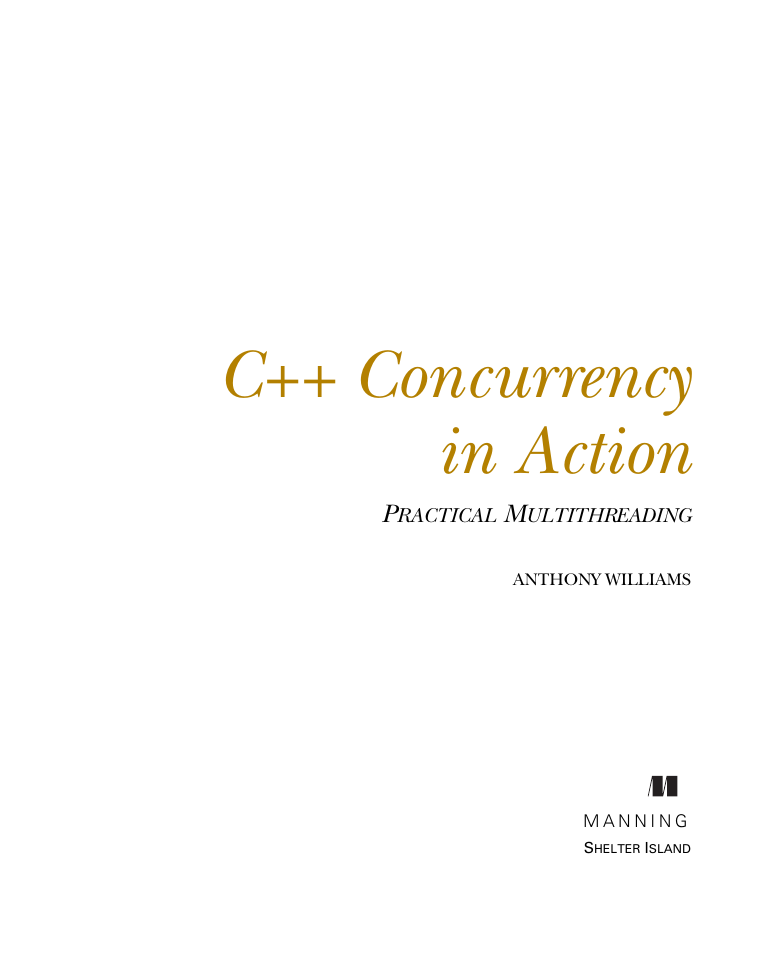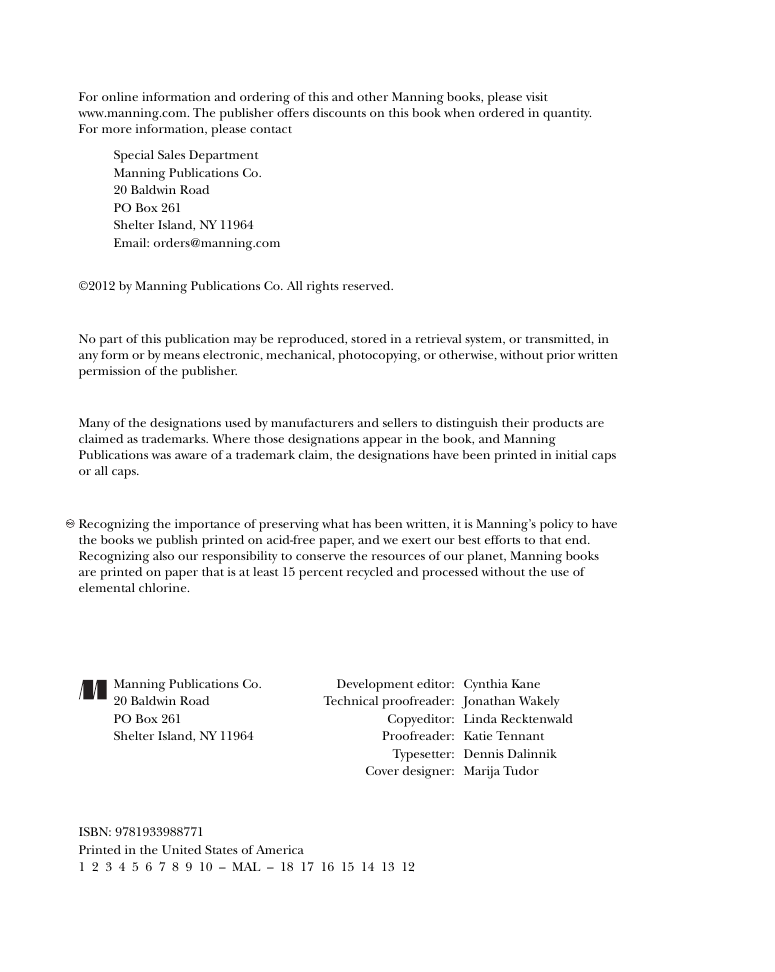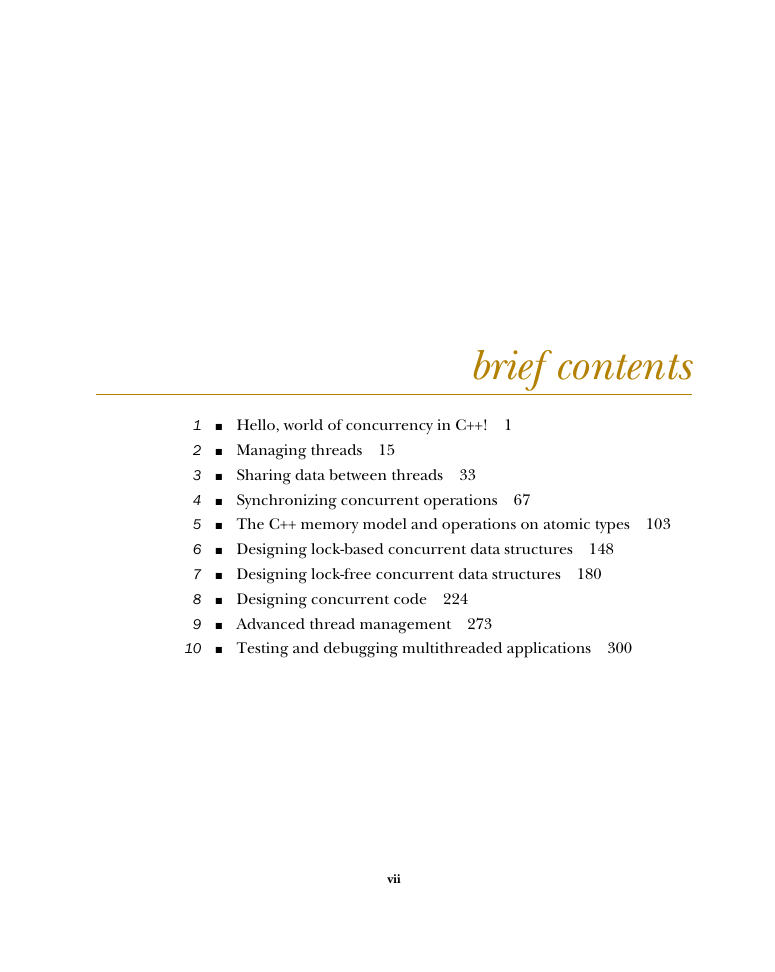Cover
brief contents
contents
preface
acknowledgments
about this book
Roadmap
Who should read this book
How to use this book
Code conventions and downloads
Software requirements
Author Online
about the cover illustration
1 Hello, world of concurrency in C++!
1.1 What is concurrency?
1.1.1 Concurrency in computer systems
1.1.2 Approaches to concurrency
1.2 Why use concurrency?
1.2.1 Using concurrency for separation of concerns
1.2.2 Using concurrency for performance
1.2.3 When not to use concurrency
1.3 Concurrency and multithreading in C++
1.3.1 History of multithreading in C++
1.3.2 Concurrency support in the new standard
1.3.3 Efficiency in the C++ Thread Library
1.3.4 Platform-specific facilities
1.4 Getting started
1.4.1 Hello, Concurrent World
1.5 Summary
2 Managing threads
2.1 Basic thread management
2.1.1 Launching a thread
2.1.2 Waiting for a thread to complete
2.1.3 Waiting in exceptional circumstances
2.1.4 Running threads in the background
2.2 Passing arguments to a thread function
2.3 Transferring ownership of a thread
2.4 Choosing the number of threads at runtime
2.5 Identifying threads
2.6 Summary
3 Sharing data between threads
3.1 Problems with sharing data between threads
3.1.1 Race conditions
3.1.2 Avoiding problematic race conditions
3.2 Protecting shared data with mutexes
3.2.1 Using mutexes in C++
3.2.2 Structuring code for protecting shared data
3.2.3 Spotting race conditions inherent in interfaces
3.2.4 Deadlock: the problem and a solution
3.2.5 Further guidelines for avoiding deadlock
3.2.6 Flexible locking with std::unique_lock
3.2.7 Transferring mutex ownership between scopes
3.2.8 Locking at an appropriate granularity
3.3 Alternative facilities for protecting shared data
3.3.1 Protecting shared data during initialization
3.3.2 Protecting rarely updated data structures
3.3.3 Recursive locking
3.4 Summary
4 Synchronizing concurrent operations
4.1 Waiting for an event or other condition
4.1.1 Waiting for a condition with condition variables
4.1.2 Building a thread-safe queue with condition variables
4.2 Waiting for one-off events with futures
4.2.1 Returning values from background tasks
4.2.2 Associating a task with a future
4.2.3 Making (std::)promises
4.2.4 Saving an exception for the future
4.2.5 Waiting from multiple threads
4.3 Waiting with a time limit
4.3.1 Clocks
4.3.2 Durations
4.3.3 Time points
4.3.4 Functions that accept timeouts
4.4 Using synchronization of operations to simplify code
4.4.1 Functional programming with futures
4.4.2 Synchronizing operations with message passing
4.5 Summary
5 The C++ memory model and operations on atomic types
5.1 Memory model basics
5.1.1 Objects and memory locations
5.1.2 Objects, memory locations, and concurrency
5.1.3 Modification orders
5.2 Atomic operations and types in C++
5.2.1 The standard atomic types
5.2.2 Operations on std::atomic_flag
5.2.3 Operations on std::atomic
5.2.4 Operations on std::atomic: pointer arithmetic
5.2.5 Operations on standard atomic integral types
5.2.6 The std::atomic<> primary class template
5.2.7 Free functions for atomic operations
5.3 Synchronizing operations and enforcing ordering
5.3.1 The synchronizes-with relationship
5.3.2 The happens-before relationship
5.3.3 Memory ordering for atomic operations
5.3.4 Release sequences and synchronizes-with
5.3.5 Fences
5.3.6 Ordering nonatomic operations with atomics
5.4 Summary
6 Designing lock-based concurrent data structures
6.1 What does it mean to design for concurrency?
6.1.1 Guidelines for designing data structures for concurrency
6.2 Lock-based concurrent data structures
6.2.1 A thread-safe stack using locks
6.2.2 A thread-safe queue using locks and condition variables
6.2.3 A thread-safe queue using fine-grained locks and condition variables
6.3 Designing more complex lock-based data structures
6.3.1 Writing a thread-safe lookup table using locks
6.3.2 Writing a thread-safe list using locks
6.4 Summary
7 Designing lock-free concurrent data structures
7.1 Definitions and consequences
7.1.1 Types of nonblocking data structures
7.1.2 Lock-free data structures
7.1.3 Wait-free data structures
7.1.4 The pros and cons of lock-free data structures
7.2 Examples of lock-free data structures
7.2.1 Writing a thread-safe stack without locks
7.2.2 Stopping those pesky leaks: managing memory in lock-free data structures
7.2.3 Detecting nodes that can't be reclaimed using hazard pointers
7.2.4 Detecting nodes in use with reference counting
7.2.5 Applying the memory model to the lock-free stack
7.2.6 Writing a thread-safe queue without locks
7.3 Guidelines for writing lock-free data structures
7.3.1 Guideline: use std::memory_order_seq_cst for prototyping
7.3.2 Guideline: use a lock-free memory reclamation scheme
7.3.3 Guideline: watch out for the ABA problem
7.3.4 Guideline: identify busy-wait loops and help the other thread
7.4 Summary
8 Designing concurrent code
8.1 Techniques for dividing work between threads
8.1.1 Dividing data between threads before processing begins
8.1.2 Dividing data recursively
8.1.3 Dividing work by task type
8.2 Factors affecting the performance of concurrent code
8.2.1 How many processors?
8.2.2 Data contention and cache ping-pong
8.2.3 False sharing
8.2.4 How close is your data?
8.2.5 Oversubscription and excessive task switching
8.3 Designing data structures for multithreaded performance
8.3.1 Dividing array elements for complex operations
8.3.2 Data access patterns in other data structures
8.4 Additional considerations when designing for concurrency
8.4.1 Exception safety in parallel algorithms
8.4.2 Scalability and Amdahl's law
8.4.3 Hiding latency with multiple threads
8.4.4 Improving responsiveness with concurrency
8.5 Designing concurrent code in practice
8.5.1 A parallel implementation of std::for_each
8.5.2 A parallel implementation of std::find
8.5.3 A parallel implementation of std::partial_sum
8.6 Summary
9 Advanced thread management
9.1 Thread pools
9.1.1 The simplest possible thread pool
9.1.2 Waiting for tasks submitted to a thread pool
9.1.3 Tasks that wait for other tasks
9.1.4 Avoiding contention on the work queue
9.1.5 Work stealing
9.2 Interrupting threads
9.2.1 Launching and interrupting another thread
9.2.2 Detecting that a thread has been interrupted
9.2.3 Interrupting a condition variable wait
9.2.4 Interrupting a wait on std::condition_variable_any
9.2.5 Interrupting other blocking calls
9.2.6 Handling interruptions
9.2.7 Interrupting background tasks on application exit
9.3 Summary
10 Testing and debugging multithreaded applications
10.1 Types of concurrency-related bugs
10.1.1 Unwanted blocking
10.1.2 Race conditions
10.2 Techniques for locating concurrency-related bugs
10.2.1 Reviewing code to locate potential bugs
10.2.2 Locating concurrency-related bugs by testing
10.2.3 Designing for testability
10.2.4 Multithreaded testing techniques
10.2.5 Structuring multithreaded test code
10.2.6 Testing the performance of multithreaded code
10.3 Summary
appendix A Brief reference for some C++11 language features
A.1 Rvalue references
A.1.1 Move semantics
A.1.2 Rvalue references and function templates
A.2 Deleted functions
A.3 Defaulted functions
A.4 constexpr functions
A.4.1 constexpr and user-defined types
A.4.2 constexpr objects
A.4.3 constexpr function requirements
A.4.4 constexpr and templates
A.5 Lambda functions
A.5.1 Lambda functions that reference local variables
A.6 Variadic templates
A.6.1 Expanding the parameter pack
A.7 Automatically deducing the type of a variable
A.8 Thread-local variables
A.9 Summary
appendix B Brief comparison of concurrency libraries
appendix C A message-passing framework and complete ATM example
appendix D C++ Thread Library reference
D.1 The header
D.1.1 std::chrono::duration class template
D.1.2 std::chrono::time_point class template
D.1.3 std::chrono::system_clock class
D.1.4 std::chrono::steady_clock class
D.1.5 std::chrono::high_resolution_clock typedef
D.2 header
D.2.1 std::condition_variable class
D.2.2 std::condition_variable_any class
D.3.1 std::atomic_xxx typedefs
D.3.2 ATOMIC_xxx_LOCK_FREE macros
D.3.3 ATOMIC_VAR_INIT macro
D.3.4 std::memory_order enumeration
D.3.5 std::atomic_thread_fence function
D.3.6 std::atomic_signal_fence function
D.3.7 std::atomic_flag class
D.3.8 std::atomic class template
D.3.9 Specializations of the std::atomic template
D.3.10 std::atomic specializations
D.4 header
D.4.1 std::future class template
D.4.2 std::shared_future class template
D.4.3 std::packaged_task class template
D.4.4 std::promise class template
D.4.5 std::async function template
D.5 header
D.5.1 std::mutex class
D.5.2 std::recursive_mutex class
D.5.3 std::timed_mutex class
D.5.4 std::recursive_timed_mutex class
D.5.5 std::lock_guard class template
D.5.6 std::unique_lock class template
D.5.7 std::lock function template
D.5.8 std::try_lock function template
D.5.9 std::once_flag class
D.5.10 std::call_once function template
D.6 header
D.6.1 std::ratio class template
D.6.2 std::ratio_add template alias
D.6.3 std::ratio_subtract template alias
D.6.4 std::ratio_multiply template alias
D.6.5 std::ratio_divide template alias
D.6.6 std::ratio_equal class template
D.6.7 std::ratio_not_equal class template
D.6.8 std::ratio_less class template
D.6.9 std::ratio_greater class template
D.6.10 std::ratio_less_equal class template
D.6.11 std::ratio_greater_equal class template
D.7 header
D.7.1 std::thread class
D.7.2 Namespace this_thread
resources
Print resources
Online resources
index
Symbols
A
B
C
D
E
F
G
H
I
J
L
M
N
O
P
Q
R
S
T
U
V
W
Back cover
















 2023年江西萍乡中考道德与法治真题及答案.doc
2023年江西萍乡中考道德与法治真题及答案.doc 2012年重庆南川中考生物真题及答案.doc
2012年重庆南川中考生物真题及答案.doc 2013年江西师范大学地理学综合及文艺理论基础考研真题.doc
2013年江西师范大学地理学综合及文艺理论基础考研真题.doc 2020年四川甘孜小升初语文真题及答案I卷.doc
2020年四川甘孜小升初语文真题及答案I卷.doc 2020年注册岩土工程师专业基础考试真题及答案.doc
2020年注册岩土工程师专业基础考试真题及答案.doc 2023-2024学年福建省厦门市九年级上学期数学月考试题及答案.doc
2023-2024学年福建省厦门市九年级上学期数学月考试题及答案.doc 2021-2022学年辽宁省沈阳市大东区九年级上学期语文期末试题及答案.doc
2021-2022学年辽宁省沈阳市大东区九年级上学期语文期末试题及答案.doc 2022-2023学年北京东城区初三第一学期物理期末试卷及答案.doc
2022-2023学年北京东城区初三第一学期物理期末试卷及答案.doc 2018上半年江西教师资格初中地理学科知识与教学能力真题及答案.doc
2018上半年江西教师资格初中地理学科知识与教学能力真题及答案.doc 2012年河北国家公务员申论考试真题及答案-省级.doc
2012年河北国家公务员申论考试真题及答案-省级.doc 2020-2021学年江苏省扬州市江都区邵樊片九年级上学期数学第一次质量检测试题及答案.doc
2020-2021学年江苏省扬州市江都区邵樊片九年级上学期数学第一次质量检测试题及答案.doc 2022下半年黑龙江教师资格证中学综合素质真题及答案.doc
2022下半年黑龙江教师资格证中学综合素质真题及答案.doc